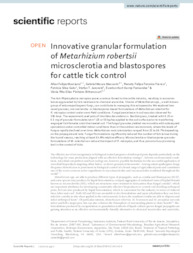Innovative granular formulation of Metarhizium robertsii microsclerotia and blastospores for cattle tick control.
Innovative granular formulation of Metarhizium robertsii microsclerotia and blastospores for cattle tick control.
Author(s): MARCIANO, A. F.; MASCARIN, G. M.; FRANCO, R. F. F.; GOLO, P. S.; JARONSKI, S. T.; FERNANDES, E. K. K.; BITTENCOURT, V. R. E. P.
Summary: Abstract: The tick Rhipicephalus microplus poses a serious threat to the cattle industry, resulting in economic losses aggravated by tick resistance to chemical acaricides. Strains of Metarhizium spp., a well-known group of entomopathogenic fungi, can contribute to managing this ectoparasite. We explored two novel granular, microsclerotia- or blastospores-based formulations of Metarhizium robertsii for R. microplus control under semi-field conditions. Fungal persistence in soil was also observed for 336 days. The experiment used pots of Urochloa decumbens cv. Basilisk grass, treated with 0.25 or 0.5 mg of granular formulation/cm2 (25 or 50 kg/ha) applied to the soil surface prior to transferring engorged tick females onto the treated soil. The fungal granules yielded more conidia with subsequent sporulation under controlled indoor conditions than in the outdoor environment, where the levels of fungus rapidly declined over time. Metarhizium-root colonization ranged from 25 to 66.7% depending on the propagule and rate. Fungal formulations significantly reduced the number of tick larvae during the humid season, reaching at least 64.8% relative efficacy. Microsclerotia or blastospores-granular formulations of M. robertsii can reduce the impact of R. microplus, and thus prove to be a promising tool in the control of ticks.
Publication year: 2021
Types of publication: Journal article
Unit: Embrapa Environment
Observation
Some of Embrapa's publications are published as ePub files. To read them, use or download one of the following free software options to your computer or mobile device. Android: Google Play Books; IOS: iBooks; Windows and Linux: Calibre.
Access other publications
Access the Agricultural Research Database (BDPA) to consult Embrapa's full library collection and records.
Visit Embrapa Bookstore to purchase books and other publications sold by Embrapa.

